How Fuel Pipe Connectors Work in Automotive Systems

Car Fuel Pipe Connectors are essential components within a vehicle’s fuel delivery system. These connectors create a secure link between the fuel lines and various parts of the engine, ensuring that fuel flows safely and efficiently from the fuel tank to the engine.
The design of fuel pipe connectors emphasizes safety and durability. Typically made from corrosion-resistant materials like nylon or metal alloys, these connectors withstand the harsh conditions of the engine bay, including exposure to fuel, heat, and vibration. Their tight sealing capabilities prevent fuel leaks, which is critical to avoid fire hazards and maintain vehicle performance.
Fuel pipe connectors come in different shapes and sizes to fit various car models and fuel systems. Some connectors use push-to-connect mechanisms, which allow easy installation and removal without the need for special tools. Others use threaded or quick-release designs that offer secure fastening and quick disconnection for maintenance purposes.
One important aspect of these connectors is their compatibility with different types of fuel, such as gasoline, diesel, and alternative fuels. Materials and seals must resist chemical degradation to maintain a reliable connection over time.
Routine inspection of fuel pipe connectors is part of regular vehicle maintenance. Over time, exposure to heat and chemicals can degrade the connectors, potentially leading to leaks or disconnections. Replacing worn connectors helps maintain the integrity of the fuel system.
In summary, car fuel pipe connectors play a vital role in maintaining the safe and efficient operation of vehicles. Understanding their design and function can assist vehicle owners and technicians in ensuring proper fuel system performance.
- Art
- Causes
- Crafts
- Crypto
- Dance
- Drinks
- Defi
- Film
- Fitness
- Food
- Jeux
- Gardening
- Health
- Domicile
- Literature
- Music
- Networking
- Autre
- Party
- Religion
- Shopping
- Sports
- Theater
- Wellness

